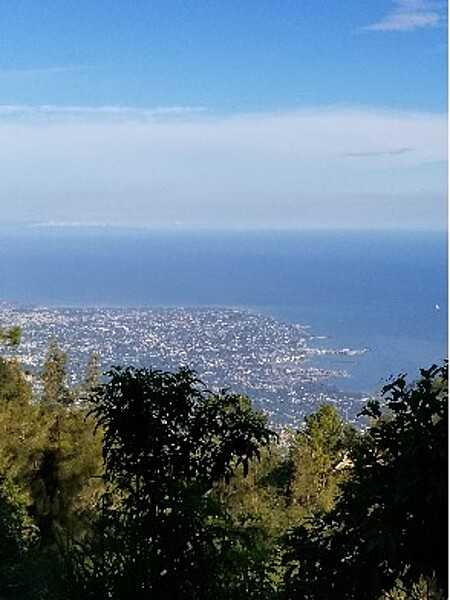Haiti - HT - HTI - HAI - Central America and the Caribbean
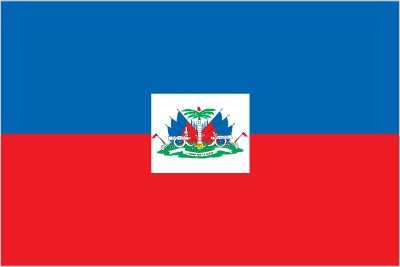
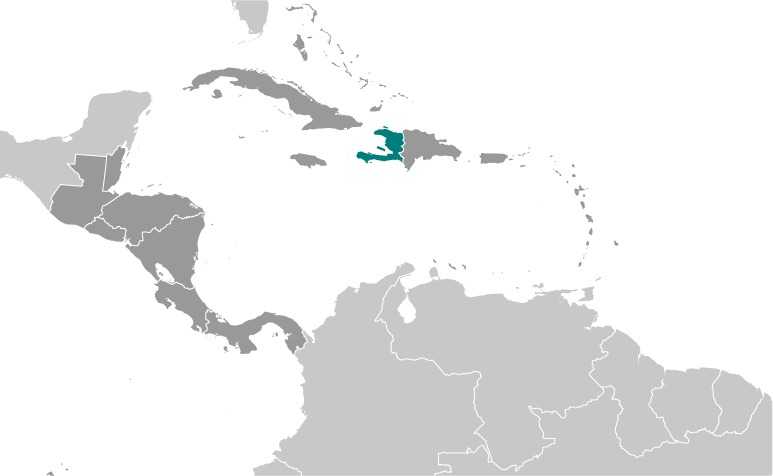
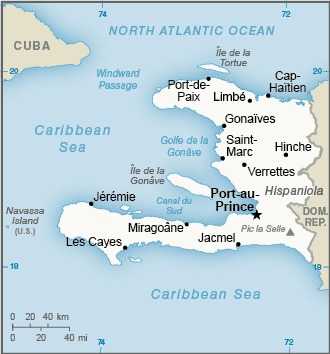
Haiti Images
Haiti Factbook Data
Diplomatic representation from the US
embassy: Tabarre 41, Route de Tabarre, Port-au-Prince
mailing address: 3400 Port-au-Prince Place, Washington, DC 20521-3400
telephone: [011] (509) 2229-8000
FAX: [011] (509) 2229-8027
email address and website:
acspap@state.gov
https://ht.usembassy.gov/
Age structure
15-64 years: 65.3% (male 3,787,782/female 3,887,791)
65 years and over: 4.2% (2024 est.) (male 214,600/female 279,499)
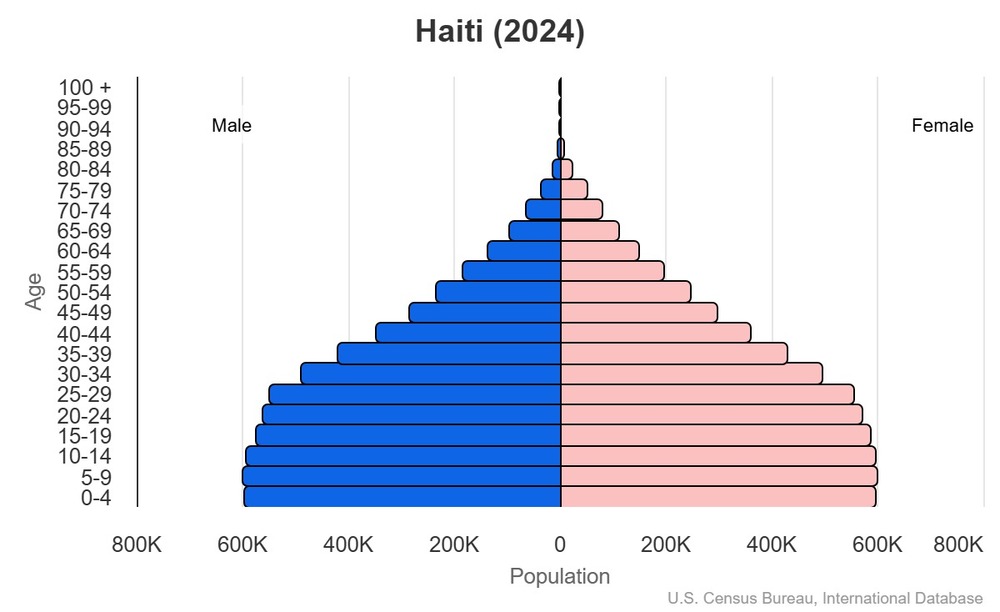
For additional information, please see the entry for Population pyramid on the Definitions and Notes page.
Geographic coordinates
Sex ratio
0-14 years: 1 male(s)/female
15-64 years: 0.97 male(s)/female
65 years and over: 0.77 male(s)/female
total population: 0.97 male(s)/female (2024 est.)
Natural hazards
Area - comparative
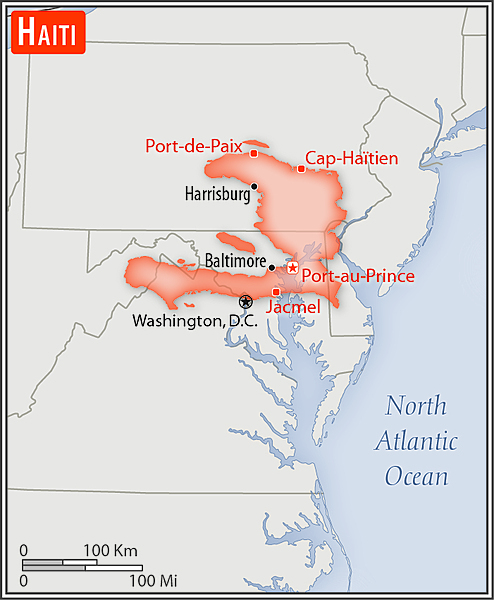
slightly smaller than Maryland
Background
The native Taino -- who inhabited the island of Hispaniola when Christopher COLUMBUS first landed in 1492 -- were virtually wiped out by Spanish settlers within 25 years. In the early 17th century, the French established a presence on Hispaniola. In 1697, Spain ceded to the French the western third of the island, which later became Haiti. The French colony, based on forestry and sugar-related industries, became one of the wealthiest in the Caribbean but relied heavily on the forced labor of enslaved Africans and environmentally degrading practices. In the late 18th century, Toussaint L'OUVERTURE led a revolution of Haiti's nearly half a million slaves that ended France's rule on the island. After a prolonged struggle, and under the leadership of Jean-Jacques DESSALINES, Haiti became the first country in the world led by former slaves after declaring its independence in 1804, but it was forced to pay an indemnity of 100 million francs (equivalent to $22 billion USD in March 2023) to France for more than a century and was shunned by other countries for nearly 40 years. In 1862, the US officially recognized Haiti, but foreign economic influence and internal political instability induced the US to occupy Haiti from 1915 to 1934.
Francois "Papa Doc" DUVALIER and then his son Jean-Claude "Baby Doc" DUVALIER led repressive and corrupt regimes that ruled Haiti in 1957-1971 and 1971-1986, respectively. Jean-Bertrand ARISTIDE was Haiti's first democratically elected president in 1991 and was elected a second time in 2000, but coups interrupted his first term after only a few months and ended his second term in 2004. President Jovenel MOÏSE was assassinated in 2021, leading the country further into an extra-constitutional governance structure and contributing to the country’s growing fragility. The Government of Haiti then installed Ariel HENRY -- whom President MOÏSE had nominated shortly before his death -- as prime minister.
On 29 February 2024, a significant escalation of gang violence occurred on the 20th anniversary of ARISTIDE's second overthrow, after the announcement that HENRY would not hold elections until August 2025. HENRY’s return from an overseas trip was diverted to Puerto Rico when the airport closed due to gang violence. With control of much of the capital, Port-au-Prince, gang leaders called for the ouster of HENRY’S government. By mid-March, Haiti’s continued violence, HENRY’S inability to return to the country, and increasing pressure from the international community led HENRY to pledge to resign. On 25 April 2024, HENRY formally submitted his resignation as a nine-member Transitional Presidential Council assumed control, tasked with returning stability to the country and preparing elections. Since January 2023, Haiti has had no sitting elected officials.
The country has long been plagued by natural disasters. In 2010, a major 7.0 magnitude earthquake struck Haiti with an epicenter about 25 km (15 mi) west of the capital, Port-au-Prince. An estimated 300,000 people were killed, and some 1.5 million left homeless. The earthquake was assessed as the worst in this region in 200 years. A 7.2 magnitude earthquake hit Haiti’s southern peninsula in 2021, causing well over 2,000 deaths; an estimated 500,000 required emergency humanitarian aid. Haiti is the poorest country in the Western Hemisphere, as well as one of the most unequal in wealth distribution.
Environmental issues
International environmental agreements
signed, but not ratified: Nuclear Test Ban
Exports - commodities
note: top five export commodities based on value in dollars
Exports - partners
note: top five export partners based on percentage share of exports
Administrative divisions
Agricultural products
note: top ten agricultural products based on tonnage
Military and security forces
Ministry of Justice and Public Security: Haitian National Police (Police Nationale d'Haïti or PNH) (2025)
note: the PNH is responsible for maintaining public security; it includes police, corrections, fire, emergency response, airport security, port security, and coast guard functions; its units include a presidential guard and a paramilitary rapid-response Motorized Intervention Unit (BIM)
Budget
expenditures: $1.527 billion (2020 est.)
Capital
geographic coordinates: 18 32 N, 72 20 W
time difference: UTC-5 (same time as Washington, DC, during Standard Time)
daylight saving time: +1hr, begins second Sunday in March; ends first Sunday in November
etymology: the name means "the port of the prince" and probably came from a ship called The Prince that anchored in the bay in the early 18th century
Imports - commodities
note: top five import commodities based on value in dollars
Climate
Coastline
Constitution
amendment process: proposed by the executive branch or by either the Senate or the Chamber of Deputies; consideration of proposed amendments requires support by at least two-thirds majority of both houses; passage requires at least two-thirds majority of the membership present and at least two-thirds majority of the votes cast; approved amendments enter into force after installation of the next president of the republic; constitutional articles on the democratic and republican form of government cannot be amended
note: the constitution is commonly referred to as the “amended 1987 constitution”
Exchange rates
Exchange rates:
131.811 (2024 est.)
141.036 (2023 est.)
115.631 (2022 est.)
89.227 (2021 est.)
93.51 (2020 est.)
Executive branch
head of government: Prime Minister Alix Didier FILS-AIMÉ (since 10 November 2024)
cabinet: Cabinet chosen by the prime minister in consultation with the president; parliament must ratify the Cabinet and prime minister's governing policy
election/appointment process: president directly elected by absolute-majority popular vote in 2 rounds, if needed, for a 5-year term (eligible for a single non-consecutive term)
most recent election date: 20 November 2016
election results:
2016: Jovenel MOÏSE elected president in first round; percent of vote - Jovenel MOÏSE (PHTK) 55.6%, Jude CELESTIN (LAPEH) 19.6%, Jean-Charles MOÏSE (PPD) 11%, Maryse NARCISSE (FL) 9%; other 4.8%
2011: Michel MARTELLY elected president in second round; percent of vote in second round - Michel MARTELLY (Peasant's Response) 68%, Mirlande MANIGAT (RDNP) 32%
expected date of next election: 30 August 2026
note: former Prime Minister Ariel HENRY, who had assumed executive responsibilities following the assassination of President MOÏSE on 7 July 2021, resigned on 24 April 2024; a nine-member Presidential Transitional Council, equipped with presidential powers, was sworn in on 25 April 2024 and will remain in place until 7 February 2026
Flag
meaning: the colors are taken from the French flag and represent the union of ethnic groups
Illicit drugs
major illicit drug-producing and/or drug-transit country (2025)
Independence
Industries
Judicial branch
judge selection and term of office: judges appointed by the president from candidate lists submitted by the Senate of the National Assembly
subordinate courts: Courts of Appeal; Courts of First Instance; magistrate's courts; land, labor, and children's courts
note: the Superior Council of the Judiciary or Conseil Supérieur du Pouvoir Judiciaire is a 9-member body charged with the administration and oversight of the judicial branch of government
note: Haiti is a member of the Caribbean Court of Justice, the Constitutional Court (called for in the 1987 constitution but not yet established), and the High Court of Justice, for trying high government officials (currently not functional)
note: Article 174 of Haiti's constitution states that judges of the Supreme Court are appointed for 10 years, whereas Article 177 states that judges of the Supreme Court are appointed for life
Land boundaries
border countries (1): Dominican Republic 376 km
Land use
arable land: 36.5% (2023 est.)
permanent crops: 10.9% (2023 est.)
permanent pasture: 17.8% (2023 est.)
forest: 13.4% (2023 est.)
other: 21.5% (2023 est.)
Legal system
Legislative branch
legislative structure: bicameral
note 1: when the two chambers meet collectively, it is known as the National Assembly (or L'Assemblée nationale) and is convened for specific purposes spelled out in the constitution
note 2: as of October 2024, the Senate and Chamber of Deputies were not functional
Literacy
male: 72.9% (2017 est.)
female: 63.9% (2017 est.)
Maritime claims
contiguous zone: 24 nm
exclusive economic zone: 200 nm
continental shelf: to depth of exploitation
International organization participation
National holiday
Nationality
adjective: Haitian
Natural resources
Geography - note
Economic overview
Political parties
Christian Movement for a New Haiti or MCNH or Mochrenha
Christian National Movement for the Reconstruction of Haiti or UNCRH
Combat of Peasant Workers to Liberate Haiti (Konbit Travaye Peyizan Pou Libere Ayiti) or Kontra Pep La
Convention for Democratic Unity or KID
Cooperative Action to Rebuild Haiti or KONBA
December 16 Platform or Platfom 16 Desanm
Democratic Alliance Party or ALYANS (coalition includes KID and PPRH)
Democratic Centers' National Council or CONACED
Democratic and Popular Sector (Secteur Démocratique et Populaire) or SDP
Democratic Unity Convention (Konvansyon Inite Demokratik) or KID
Dessalinian Patriotic and Popular Movement or MOPOD
Effort and Solidarity to Create an Alternative for the People or ESKAMP
Fanmi Lavalas or FL
Forward (En Avant)
Fusion of Haitian Social Democrats (Fusion Des Sociaux-Démocrates Haïtiens) or FHSD
G18 Policy Platform (Plateforme Politique G18)
Haiti in Action (Ayiti An Aksyon Haiti's Action) or AAA
Haitian Tet Kale Party (Parti Haitien Tet Kale) or PHTK
Independent Movement for National Reconciliation or MIRN
Lavni Organization or LAVNI
Lod Demokratik
Love Haiti (Renmen Ayiti) or RA
MTV Ayiti
National Consortium of Haitian Political Parties (Consortium National des Partis Politiques Haitiens) or CNPPH
National Shield Network (Reseau Bouclier National)
Organization of the People's Struggle (Oganizasyon Pep Kap Lite) or OPL
Patriotic Unity (Inite Patriyotik) or Inite
Platform Pitit Desalin (Politik Pitit Dessalines) or PPD
Political Party for Us All or Bridge (Pont) or Pou Nou Tout
Popular Patriotic Dessalinien Movement (Mouvement Patriotique Populaire Dessalinien) or MOPOD
Rally of Progressive National Democrats (Rassemblement des Démocrates Nationaux Progressistes) or RDNP
Respe (Respect)
Women and Families Political Parties (Defile Pati Politik Fanm Ak Fanmi)
Suffrage
Terrain
Government type
Country name
conventional short form: Haiti
local long form: République d'Haïti (French)/Repiblik d Ayiti (Haitian Creole)
local short form: Haïti (French)/ Ayiti (Haitian Creole)
etymology: derived from the Arawak name Ayti, meaning "Land of Mountains," that was originally applied to the entire island of Hispaniola
Location
Map references
Irrigated land
Diplomatic representation in the US
chancery: 2311 Massachusetts Avenue NW, Washington, DC 20008
telephone: [1] (202) 332-4090
FAX: [1] (202) 745-7215
email address and website:
amb.washington@diplomatie.ht
https://www.haiti.org/
consulate(s) general: Atlanta, Boston, Chicago, Miami, Orlando (FL), New York
Internet users
Internet country code
Refugees and internally displaced persons
IDPs: 1,041,229 (2024 est.)
GDP (official exchange rate)
note: data in current dollars at official exchange rate
Total renewable water resources
Urbanization
rate of urbanization: 2.47% annual rate of change (2020-25 est.)
Broadcast media
Drinking water source
urban: 84.6% of population (2022 est.)
rural: 42.8% of population (2022 est.)
total: 67.4% of population (2022 est.)
unimproved:
urban: 15.4% of population (2022 est.)
rural: 57.2% of population (2022 est.)
total: 32.6% of population (2022 est.)
National anthem(s)
lyrics/music: Justin LHERISSON/Nicolas GEFFRARD
history: adopted 1904; named for Jean-Jacques DESSALINES, founder of Haiti
Major urban areas - population
International law organization participation
Hospital bed density
National symbol(s)
Mother's mean age at first birth
note: data represents median age at first birth among women 25-49
GDP - composition, by end use
government consumption: 5.7% (2024 est.)
investment in fixed capital: 9.9% (2024 est.)
investment in inventories: 0% (2024 est.)
exports of goods and services: 3.4% (2024 est.)
imports of goods and services: -18.8% (2024 est.)
note: figures may not total 100% due to rounding or gaps in data collection
Dependency ratios
youth dependency ratio: 46.7 (2024 est.)
elderly dependency ratio: 6.4 (2024 est.)
potential support ratio: 15.5 (2024 est.)
Citizenship
citizenship by descent only: at least one parent must be a native-born citizen of Haiti
dual citizenship recognized: yes
residency requirement for naturalization: 5 years
Population distribution
Electricity access
electrification - urban areas: 83%
electrification - rural areas: 1.2% (2019 est.)
Civil aircraft registration country code prefix
Sanitation facility access
urban: 82.9% of population (2022 est.)
rural: 42.6% of population (2022 est.)
total: 66.3% of population (2022 est.)
unimproved:
urban: 17.1% of population (2022 est.)
rural: 57.4% of population (2022 est.)
total: 33.7% of population (2022 est.)
Ethnic groups
Religions
note: 50-80% of Haitians incorporate some elements of Vodou culture or practice in addition to another religion, most often Roman Catholicism; Vodou was recognized as an official religion in 2003
Languages
major-language sample(s): The World Factbook, une source indispensable d'informations de base. (French)
The World Factbook, sous endispansab pou enfomasyon debaz. (Haitian Creole)
The World Factbook, the indispensable source for basic information.
Imports - partners
note: top five import partners based on percentage share of imports
Elevation
lowest point: Caribbean Sea 0 m
mean elevation: 470 m
Physician density
Health expenditure
4.1% of national budget (2022 est.)
Military - note
in 2023, the UN Security Council approved the deployment of a Kenya-led multinational security support mission (MSS) to help bring gang violence under control; the first contingent of MSS personnel from the Kenya National Police Service arrived in mid-2024; other countries pledging forces included the Bahamas, Bangladesh, Barbados, Benin, Chad, and Jamaica; the mission is slated to have a total of 2,500 personnel (2025)
Military service age and obligation
Military and security service personnel strengths
Total water withdrawal
industrial: 51 million cubic meters (2022 est.)
agricultural: 1.209 billion cubic meters (2022 est.)
Waste and recycling
percent of municipal solid waste recycled: 9.1% (2022 est.)
National heritage
selected World Heritage Site locales: National History Park – Citadel, Sans Souci, Ramiers
Child marriage
women married by age 18: 14.9% (2017)
men married by age 18: 1.6% (2017)
Coal
Electricity generation sources
solar: 0.4% of total installed capacity (2023 est.)
hydroelectricity: 18.3% of total installed capacity (2023 est.)
Natural gas
imports: 3.2 million cubic meters (2023 est.)
Petroleum
Currently married women (ages 15-49)
Remittances
18.8% of GDP (2022 est.)
19.1% of GDP (2021 est.)
note: personal transfers and compensation between resident and non-resident individuals/households/entities
Ports
large: 0
medium: 1
small: 0
very small: 4
ports with oil terminals: 1
key ports: Cap Haitien, Jacmel, Miragoane, Petit Goave, Port au Prince
Terrorist group(s)
note: details about the history, aims, leadership, organization, areas of operation, tactics, targets, weapons, size, and sources of support of the group(s) appear(s) in the Terrorism reference guide
Legislative branch - lower chamber
number of seats: 119 (all directly elected)
electoral system: plurality/majority
scope of elections: full renewal
term in office: 4 years
most recent election date: 8/9/2015 to 10/25/2015
parties elected and seats per party: Haitian Tet Kale Party (PHTK) (9); Konvansyon Inite Demokratik (KID) (7); Ayiti an aksyon (AAA) (6); Fanmi Lavalas (6); Patriotic Unity Party (Inite Patriyotik) (4); People's Struggle Party (OPL) (7); Other (24)
percentage of women in chamber: 0%
expected date of next election: August 2026
Legislative branch - upper chamber
number of seats: 30 (all directly elected)
electoral system: plurality/majority
scope of elections: partial renewal
term in office: 6 years
most recent election date: 11/20/2016 to 1/29/2017
parties elected and seats per party: Haitian Tet Kale Party (PHTK) (9); Truth (Vérité) (3); Konvansyon Inite Demokratik (KID) (2); Bouclier (2); Ayiti an aksyon (AAA) (2); Other (10)
expected date of next election: August 2026
National color(s)
Particulate matter emissions
Labor force
note: number of people ages 15 or older who are employed or seeking work
Youth unemployment rate (ages 15-24)
male: 30% (2024 est.)
female: 47.1% (2024 est.)
note: % of labor force ages 15-24 seeking employment
Debt - external
note: present value of external debt in current US dollars
Maternal mortality ratio
Reserves of foreign exchange and gold
$2.586 billion (2023 est.)
$2.173 billion (2022 est.)
note: holdings of gold (year-end prices)/foreign exchange/special drawing rights in current dollars
Unemployment rate
14.6% (2023 est.)
14.7% (2022 est.)
note: % of labor force seeking employment
Population
male: 5,792,443
female: 5,961,500
Carbon dioxide emissions
from petroleum and other liquids: 2.848 million metric tonnes of CO2 (2023 est.)
from consumed natural gas: 6,000 metric tonnes of CO2 (2023 est.)
Area
land: 27,560 sq km
water: 190 sq km
Real GDP (purchasing power parity)
$34.406 billion (2023 est.)
$35.059 billion (2022 est.)
note: data in 2021 dollars
Airports
Inflation rate (consumer prices)
36.8% (2023 est.)
34% (2022 est.)
note: annual % change based on consumer prices
Current account balance
-$491.954 million (2022 est.)
$87.656 million (2021 est.)
note: balance of payments - net trade and primary/secondary income in current dollars
Real GDP per capita
$3,000 (2023 est.)
$3,000 (2022 est.)
note: data in 2021 dollars
Broadband - fixed subscriptions
subscriptions per 100 inhabitants: (2022 est.) less than 1
Tobacco use
male: 12.4% (2025 est.)
female: 2.1% (2025 est.)
Obesity - adult prevalence rate
Energy consumption per capita
Electricity
consumption: 861 million kWh (2023 est.)
transmission/distribution losses: 152 million kWh (2023 est.)
Merchant marine
by type: general cargo 3, other 1
Children under the age of 5 years underweight
Imports
$5.451 billion (2022 est.)
$5.048 billion (2021 est.)
note: balance of payments - imports of goods and services in current dollars
Exports
$1.355 billion (2022 est.)
$1.272 billion (2021 est.)
note: balance of payments - exports of goods and services in current dollars
Heliports
Telephones - fixed lines
subscriptions per 100 inhabitants: (2022 est.) less than 1
Alcohol consumption per capita
beer: 0.55 liters of pure alcohol (2019 est.)
wine: 0.03 liters of pure alcohol (2019 est.)
spirits: 2.26 liters of pure alcohol (2019 est.)
other alcohols: 0 liters of pure alcohol (2019 est.)
Life expectancy at birth
male: 63.8 years
female: 67.4 years
Real GDP growth rate
-1.9% (2023 est.)
-1.7% (2022 est.)
note: annual GDP % growth based on constant local currency
Industrial production growth rate
note: annual % change in industrial value added based on constant local currency
GDP - composition, by sector of origin
industry: 33.4% (2024 est.)
services: 48.3% (2024 est.)
note: figures may not total 100% due to non-allocated consumption not captured in sector-reported data
Education expenditure
13.2% national budget (2025 est.)
Military equipment inventories and acquisitions
Trafficking in persons
Gross reproduction rate
Net migration rate
Median age
male: 24.7 years
female: 25.3 years
Total fertility rate
Infant mortality rate
male: 40.2 deaths/1,000 live births
female: 33.5 deaths/1,000 live births
Telephones - mobile cellular
subscriptions per 100 inhabitants: 64 (2021 est.)
